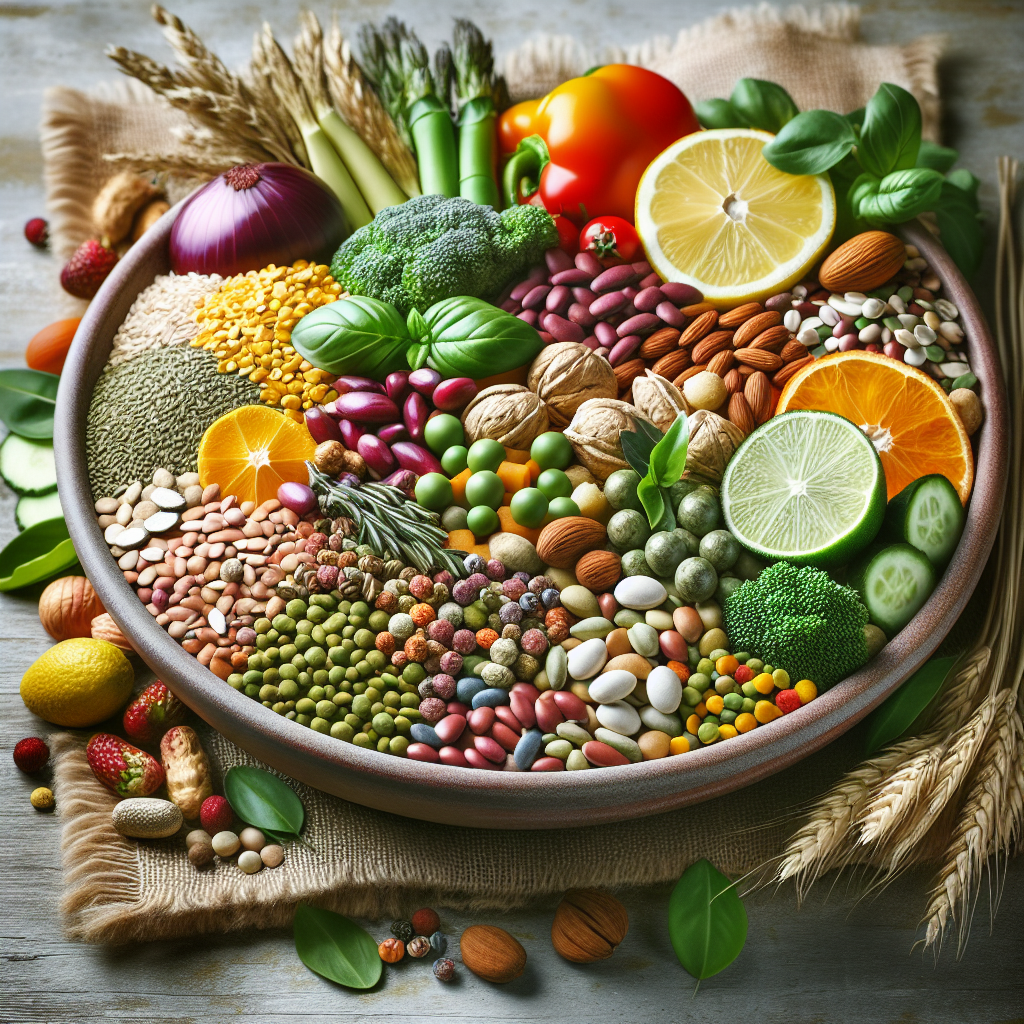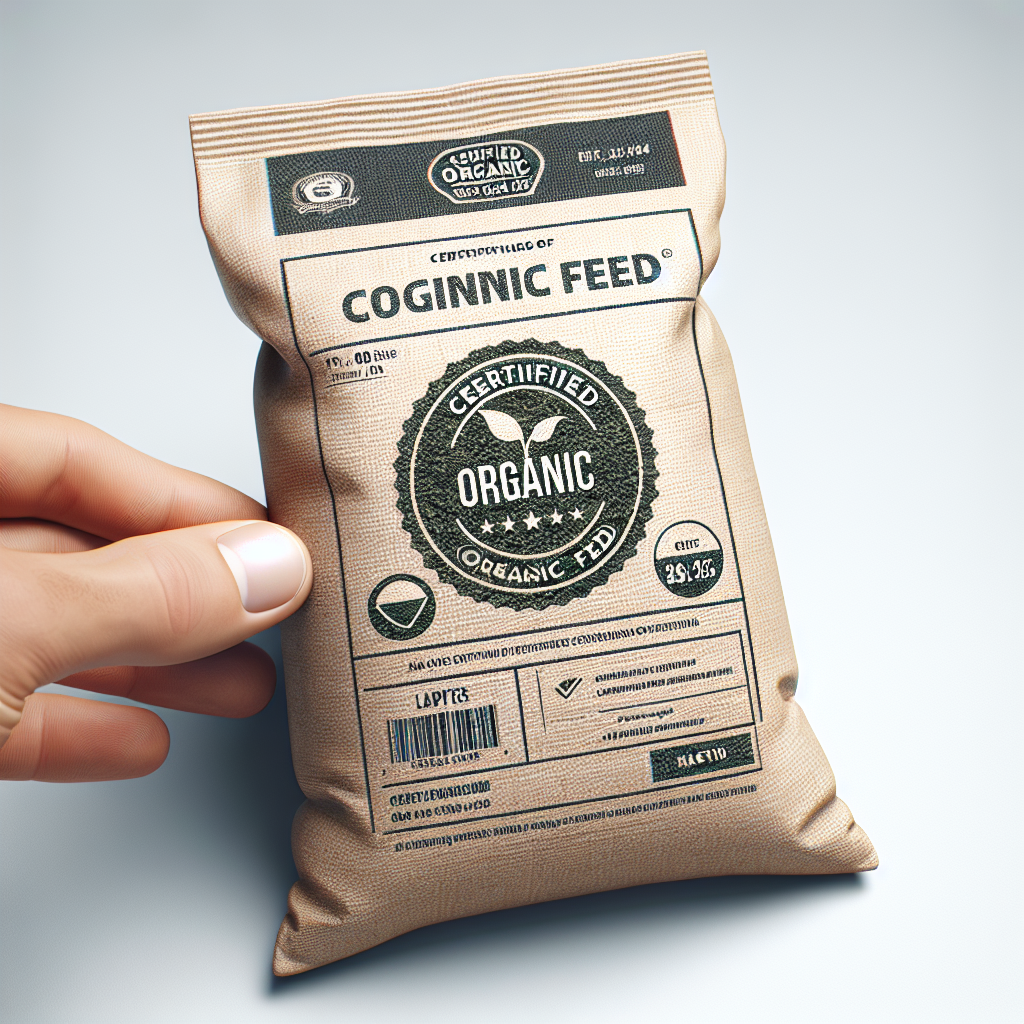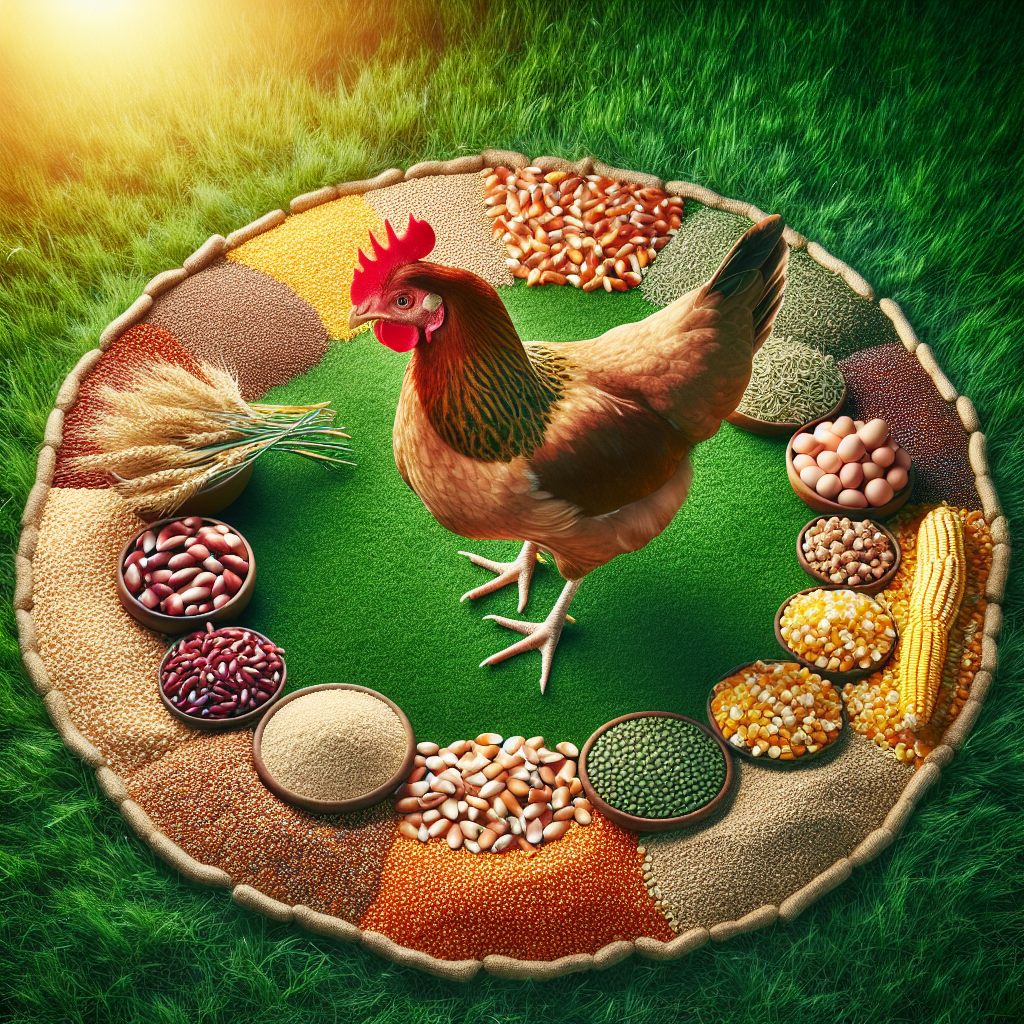In this article, we’ll explore the fascinating world of organic feed options for different life stages and purposes of poultry. From egg-laying to meat birds, we’ll uncover whether there are specialized organic feeds available to meet their unique nutritional needs. If you’re curious about the possibilities and ways to provide the best care for your feathery friends, read on to discover the answers you seek.
General Overview
Organic feed options have gained popularity in recent years as more people are becoming conscious of the quality and origin of their food. When it comes to poultry, there are various types of organic feed available, each tailored to specific life stages and purposes. These feeds are free from synthetic pesticides, antibiotics, and genetically modified organisms (GMOs), providing a natural and holistic approach to poultry nutrition.
Types of Organic Feed Options
There is a wide range of organic feed options available for poultry, including egg-laying birds and meat birds. These feeds are typically made from a combination of organic grains, legumes, fruits, vegetables, and herbs. Some popular types of organic feed include whole grain, pelletized, and crumble feed. Each type has its advantages and is suitable for different poultry needs.
Benefits of Organic Feed
Choosing organic feed for your poultry comes with several benefits. Firstly, organic feed ensures that your birds receive a nutrient-rich diet without the harmful chemicals commonly found in conventional feeds. This promotes the overall health and well-being of your birds, resulting in improved vitality, immunity, and disease resistance.
Secondly, organic feed supports sustainable and environmentally friendly practices. By opting for organic feed, you are supporting the growth of organic agriculture, which emphasizes soil health, biodiversity, and resource conservation.
Furthermore, using organic feed can also contribute to the production of high-quality, nutritious eggs and meat. Many consumers prefer organic products for their superior taste, texture, and nutritional profile. By feeding your birds organic feed, you are providing them with the best possible ingredients to produce superior-quality eggs and meat.
Challenges of Organic Feed
While organic feed offers numerous benefits, there are also some challenges that poultry owners may encounter. One of the main challenges is the higher cost of organic feed compared to conventional feed. The organic feed production process is more labor-intensive and requires greater attention to detail, which can drive up the cost of the final product.
Another challenge is the availability of organic feed. Depending on your location, finding reliable suppliers of organic feed might be more difficult compared to conventional feed. It is essential to do thorough research and establish connections with reputable organic feed suppliers to ensure a consistent and reliable supply.
Organic Feed for Egg-laying Birds
Selection Criteria for Organic Feed
When selecting organic feed for your egg-laying birds, several factors should be considered. Firstly, ensure that the feed is certified organic by recognized regulatory bodies. Look for certifications such as USDA Organic or Certified Organic to ensure the feed meets strict organic standards.
Additionally, consider the specific nutritional needs of your egg-laying birds. Look for feeds that are formulated specifically for layers, as they contain the optimal balance of nutrients necessary for egg production. It is also important to check the ingredient list and make sure it includes essential vitamins, minerals, and protein sources.
Key Nutrients for Egg-laying Birds
Egg-laying birds have unique nutritional requirements to support their egg production. The key nutrients to look for in organic feed for these birds include:
-
Protein: Egg-laying birds require a diet high in protein to support egg development. Look for organic feed options that contain high-quality protein sources such as soybean meal, fish meal, or dried insects.
-
Calcium: Adequate calcium intake is crucial for eggshell formation. Choose organic feed that includes a sufficient amount of calcium, either from naturally occurring sources like oyster shells or through added supplements like organic calcium carbonate.
-
Omega-3 Fatty Acids: Incorporating omega-3 fatty acids into the diet of egg-laying birds can enhance the nutritional profile of their eggs. Look for organic feed that contains flaxseed or fish oil, as these are excellent sources of omega-3 fatty acids.
Examples of Organic Feed for Egg-laying Birds
There are several reputable brands that offer organic feed options tailored specifically for egg-laying birds. The “Organic Layer Pellets” from XYZ Farms is a popular choice among poultry owners. It contains a balanced blend of organic grains, legumes, vitamins, and minerals to meet the unique nutritional needs of layers. Another option is the “Free-Range Layer Crumbles” from ABC Organics, which provides certified organic ingredients and additional herbs for enhanced egg quality.
Organic Feed for Meat Birds
Selection Criteria for Organic Feed
When it comes to choosing organic feed for meat birds, certain factors should be considered. Look for certified organic feed that meets the specific nutritional requirements of meat birds. Ensure that the feed is free from antibiotics, growth hormones, and other synthetic additives.
Consider the growth rate and breed of your meat birds. Different breeds may have varying nutritional needs, so it is important to select organic feed that meets the specific requirements of your birds.
Key Nutrients for Meat Birds
Meat birds have different nutritional needs compared to egg-laying birds, as their primary goal is rapid growth and muscle development. The key nutrients to prioritize in organic feed for meat birds include:
-
Protein: Meat birds require a high-protein diet to support their rapid growth. Look for organic feeds that contain a balanced blend of plant-based protein sources such as soybean meal and organic grains like corn and wheat.
-
Energy: Organic feed for meat birds should provide a sufficient amount of energy to support their rapid growth. This can be achieved through organic grains and fats like organic soybean oil.
-
Vitamins and Minerals: Meat birds need adequate vitamins and minerals for healthy bone development and overall growth. Choose organic feeds that include essential vitamins and minerals like vitamin B12, vitamin D, and selenium.
Examples of Organic Feed for Meat Birds
There are various trusted brands that offer organic feed options tailored specifically for meat birds. The “Organic Meat Bird Starter Feed” from XYZ Farms is a common choice among poultry owners. It contains a blend of organic grains, legumes, and protein sources to support rapid growth and muscle development. Another option is the “Free-Range Meat Bird Crumbles” from ABC Organics, which provides organic ingredients and additional herbs for improved meat quality and flavor.
Other Life Stages and Purposes
Organic feed options are not limited to just egg-laying birds and meat birds. They can also be tailored for other life stages and purposes within the poultry industry.
Organic Feed Options for Chicks
Chicks have specific dietary needs to support their growth and development. Organic feed options for chicks typically come in crumble form, making it easier for them to consume. These feeds are formulated to provide essential nutrients, vitamins, and minerals necessary for healthy chick development.
Organic Feed Options for Broilers
Broilers, or chickens raised for meat production, require organic feed that promotes healthy growth and muscle development. Organic broiler feeds are typically high in protein and energy to support rapid growth. These feeds may also include natural supplements to support bone health and overall well-being.
Organic Feed Options for Breeders
Breeders play a vital role in poultry production, and their nutritional needs differ from other poultry types. Organic feed for breeders is designed to support fertility, egg production, and overall reproductive health. These feeds are formulated to provide the necessary nutrients to optimize breeding performance.
Organic Feed Options for Show Birds
Show birds require special care and nutrition to enhance their appearance and overall presentation. Organic feed options for show birds are often formulated with specific ingredients to promote feather quality, pigmentation, and overall vitality. These feeds may also include certain supplements to support their immune system and enhance their physical appearance.
Importance of Tailored Feeding
Tailoring the organic feed to the specific life stages and purposes of your poultry is crucial for their optimal health and performance. By providing customized nutrition, you can ensure that your birds receive the necessary nutrients at each stage of their development.
Customized Nutrition for Optimal Health
Different life stages and purposes have unique nutritional requirements. By selecting organic feeds tailored to these needs, you can provide your poultry with the optimal balance of proteins, vitamins, minerals, and other essential nutrients. This helps support their overall health, immunity, and growth.
Maximizing Production and Efficiency
Tailoring the organic feed to the specific purposes of your poultry can also help maximize production and efficiency. By providing the appropriate nutrients, you can promote optimal egg production, meat yield, or breeding performance. This can result in higher productivity and profitability for poultry farmers.
Transitioning to Organic Feed
Transitioning from conventional feed to organic feed requires proper planning and careful consideration. Here are some steps to guide you through the transition process:
Steps for Transitioning to Organic Feed
-
Research and Find Suppliers: Identify reputable suppliers of organic feed in your area. Check their certifications, reviews, and availability of different organic feed options.
-
Gradual Transition: Start by mixing small amounts of organic feed with your conventional feed. Gradually increase the proportion of organic feed over several weeks to allow your birds to adjust to the new diet.
-
Monitor Health and Performance: Keep a close eye on your birds’ health and performance during the transition period. Make sure they are adapting well to the organic feed and consult a veterinarian if any issues arise.
-
Complete Transition: Once your birds have successfully adapted to the organic feed, gradually phase out the use of conventional feed completely. Ensure a consistent supply of organic feed to maintain the transition.
Considerations for Successful Transition
Transitioning to organic feed can be a significant change for your poultry. Consider the following factors for a successful transition:
-
Cost: Organic feed is generally more expensive than conventional feed. Budget accordingly to ensure you can sustain the increased cost in the long run.
-
Availability: Ensure a consistent and reliable supply of organic feed. Establish connections with multiple suppliers to mitigate any potential shortages.
-
Nutritional Balance: Pay attention to the nutritional balance of the organic feed and ensure it meets the specific needs of your poultry. Consult with poultry nutrition experts if needed.
-
Monitoring and Adjusting: Regularly monitor the health and performance of your birds to make any necessary adjustments to their diet or feeding regimen.
Availability and Sourcing
Finding reliable suppliers of organic feed is crucial for maintaining a consistent and sustainable supply. Here are some strategies to help you find organic feed suppliers:
Finding Organic Feed Suppliers
-
Local Organic Farms: Reach out to local organic farms and inquire about their organic feed options. Many farms also sell their organic feed to other poultry owners.
-
Online Platforms: Explore online marketplaces and websites dedicated to organic feed products. Check customer reviews, certifications, and delivery options.
-
Organic Associations: Contact organic associations or agricultural organizations in your region. They can provide recommendations and information about certified organic feed suppliers.
Certifications and Standards to Look For
When sourcing organic feed, it is important to look for certifications and standards to ensure the quality and authenticity of the products. Some recognized certifications to look for include:
-
USDA Organic Certification: This certification ensures that the organic feed meets the strict standards set by the United States Department of Agriculture (USDA).
-
Certified Organic: Look for products certified by reputable organic certification bodies, such as the Organic Materials Review Institute (OMRI) or Certified Naturally Grown (CNG).
-
Non-GMO Project Verified: If you are concerned about genetically modified organisms (GMOs), consider looking for feeds with this certification.
Cost Considerations
Comparing the costs of organic feed versus conventional feed is an important factor to consider before making the switch. While organic feed may be more expensive, it is essential to evaluate its cost-effectiveness in the long run.
Comparing Costs of Organic Feed vs. Conventional Feed
Initially, the cost of organic feed may be higher compared to conventional feed. Organic feed production involves more stringent regulations, certifications, and often higher-quality ingredients, which contribute to the increased cost.
However, it is important to consider the long-term benefits of organic feed. Improved bird health, enhanced product quality, and customer demand for organic products can translate into higher market value and profitability for poultry farmers. Conduct a cost-benefit analysis based on your specific production goals and market conditions.
Evaluating Cost-Effectiveness
When evaluating the cost-effectiveness of organic feed, consider the following factors:
-
Market Demand: Research consumer preferences and market demand for organic poultry products. Higher market value for organic eggs or meat can offset the initial cost of organic feed.
-
Health and Disease Management: Investing in organic feed can contribute to healthier birds and a lower risk of disease. This can reduce veterinary costs and losses associated with illness or mortality.
-
Risk Assessment: Assess the potential risks of using conventional feed, such as the presence of pesticide residues or antibiotic resistance. Organic feed eliminates or minimizes these risks, contributing to long-term sustainability and consumer trust.
Case Studies
Success stories of using tailored organic feed highlight the positive impact it can have on poultry health, productivity, and profitability. Here are a few examples:
Case Study 1: Organic Egg Production
XYZ Farm decided to transition their egg-laying flock to organic feed. After a gradual transition process, they noticed a significant improvement in egg quality, shell thickness, and yolk color. They also received positive feedback from their customers, who appreciated the superior taste and nutritional value of the organic eggs. With increased market demand and higher product value, XYZ Farm experienced improved profitability and customer loyalty.
Case Study 2: Organic Broiler Production
ABC Farm wanted to meet the growing demand for organic meat. They transitioned their broiler flock to organic feed and observed faster growth rates, improved feed conversion ratios, and higher meat yield compared to their previous conventional feed. By capitalizing on the higher market value of organic meat, ABC Farm was able to increase their revenue and expand their customer base.
These case studies demonstrate the benefits of tailored organic feed in improving product quality, customer satisfaction, and overall profitability in the poultry industry.
Future Trends
The organic feed industry is continuously evolving to meet the specific life stages and purposes of poultry. Here are some future trends and advancements to watch out for:
Innovations in Organic Feed for Specific Life Stages and Purposes
As research and development in organic poultry production continue to advance, we can expect to see more specialized organic feed options for specific life stages and purposes. This includes feeds formulated to support the nutritional needs of different breeds, optimize broiler growth rates, or enhance the performance of show birds.
Research and Development Advancements
Researchers are continuously exploring new ingredients, formulations, and production techniques for organic feed. This includes the incorporation of alternative protein sources, such as insect-based proteins, to address sustainability concerns and reduce reliance on traditional protein sources like soy. Additionally, advancements in feed processing technology and nutrient delivery systems are being developed to further optimize the nutritional value and effectiveness of organic feed.
As the demand for organic poultry products continues to rise, these advancements will shape the future of organic feed, ensuring a greater variety of tailored options and improved overall sustainability in poultry production.
In conclusion, organic feed options tailored for specific life stages and purposes provide poultry owners with the opportunity to optimize the health, productivity, and sustainability of their flocks. By selecting certified organic feeds, prioritizing key nutrients, and customizing the diet according to the specific needs of the birds, poultry owners can ensure their birds receive the best possible nutrition. Though challenges such as cost and availability exist, the long-term benefits, including improved product quality and customer satisfaction, make the transition to organic feed a worthwhile investment. As the organic feed industry continues to grow and evolve, future innovations and advancements will further enhance the options available to poultry owners, ensuring a sustainable and thriving poultry industry.




